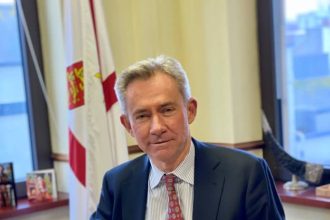The President of the Nigerian Association of Chambers of Commerce, Industry, Mines, and Agriculture, Dele Kelvin Oye, has raised concerns over Nigeria’s high interest rates, saying they harm businesses and discourage economic growth.
Oye shared these views at the “All Nigerian Editors’ Conference 2024” in Yenagoa, Bayelsa State, over the weekend calling for central bank reforms that align with the needs of Nigerian businesses.
“High interest rates – peaking at 35-40 percent – reflect a central banking system that appears disconnected from the needs of its populace and businesses,” Oye said, adding that the current high-interest regime pushes local banks to invest in bonds rather than support business loans. He explained, “This trend discourages entrepreneurship and diminishes economic growth.”
Oye also pointed out the rapid depreciation of the Naira due to what he described as poor management of Nigeria’s foreign exchange market, with the exchange rate falling from N460.70 in May 2023 to about N1,735 per dollar by November 2024. “The absence of transparent, stable exchange policies has been a significant contributor to hunger and economic distress among our people,” he added.
He also criticized Nigeria’s government structure, saying it places more value on political offices than productive industries. “The current framework is designed in a way that favors the political elite over the working class, making it challenging for production to thrive,” he stated. Oye suggested that elected officials, especially legislators, should serve part-time, with their funding solely from their constituents.
Regarding taxation, Oye said the current system favors political elites over productive sectors and urged that tax revenue be directed toward infrastructure and community development. He cautioned against over-taxation, stressing that, “no state will tax its citizens beyond their ability to pay and still expect the economy to grow.”
Oye further warned President Bola Ahmed Tinubu’s administration not to engage in a “blame game” with previous administrations, advising the government to take responsibility for its policies to aid Nigeria’s economic recovery. “While it is essential to understand the historical context of our current situation, the government must also take responsibility for its present and future policies,” he noted.
Oye concluded by encouraging editors and the media to hold the government accountable. “The Nigerian Guild of Editors must assume a proactive stance in holding government and corporate entities accountable for their actions,” he said, emphasizing that media oversight is key to building transparency and public trust in Nigeria’s institutions.
He urged, “The future is in our hands. Together, let us write the next chapter of Nigeria’s story as one defined by transparency, accountability, and transformative growth.”











